As the clock ticked towards midnight on New Year’s Eve, Randall Hector took a moment to reflect on the deadliest year in Trinidad and Tobago’s recent history.
‘We have had a very bloody 2024,’ the 43-year-old special prosecutor told the congregation at a church service in Port of Spain, capital of the two-island Caribbean nation.
‘Right now we are in a state of emergency. But regardless of what is happening out there, God has protected us.’
What Hector, a former legal director of the country’s Security Services Agency, could not have known was that he too was about to become a victim of the wave of gun violence that had already claimed an unprecedented 623 lives in Trinidad and Tobago over the previous 12 months.
Having left the service with his wife and two children, Hector was approaching his car when two vehicles pulled up, gunmen emerged, and he was shot dead at point-blank range, the latest fatality in what Fitzgerald Hinds, the national security minister, described during the declaration of a public emergency the previous day as ‘an epidemic’.
In a country traditionally defined by its picture postcard beaches, spectacular carnival and vibrant music scene, Hector’s murder marked another savage twist in an ever-worsening spiral of violence.
During a spate of violence the previous weekend, a 57-year-old woman who was picking up her teenage son from a hospital in San Fernando was among seven people who died in shootings. Also among the murdered was a man, believed to be a gang member, who was gunned down near a police station in Port of Spain; within hours of his death, five people were shot dead on the outskirts of the capital in what police believe was a reprisal attack.
Ian Alleyne, the executive producer of Crime Watch, the country’s most viewed TV programme, says the shootings were the straw that broke the camel’s back.
‘Late into Sunday night, hours after the five people were killed, the national security council, chaired by the prime minister, met in an emergency session and a decision was taken to call a state of emergency,’ said Alleyne.
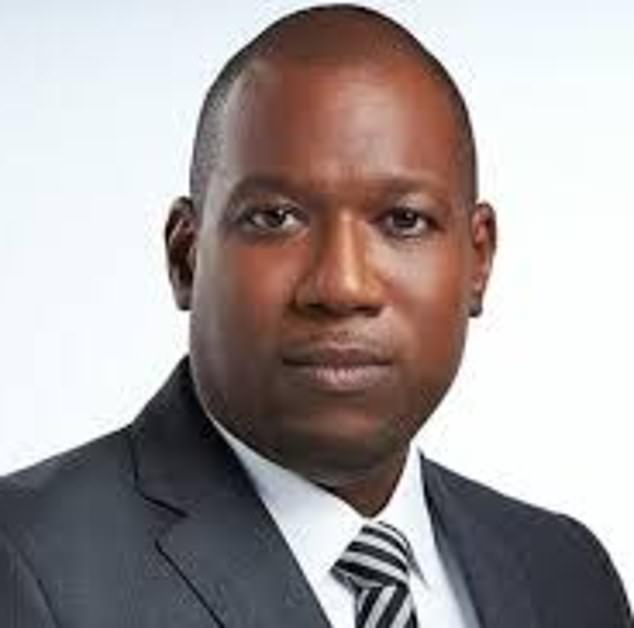
Hector Randall, a 43-year-old special prosecutor and former legal director of Trinidad and Tobago’s Security Services Agency, was gunned down in front of his family on New Year’s Eve
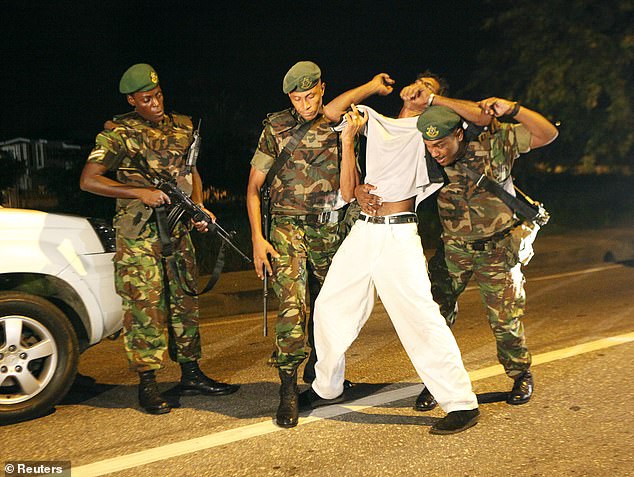
Soldiers patrolling the streets in Cunupia, central Trinidad, assist a drunken man. A state of emergency has been declared in the country after a record 624 murders last year
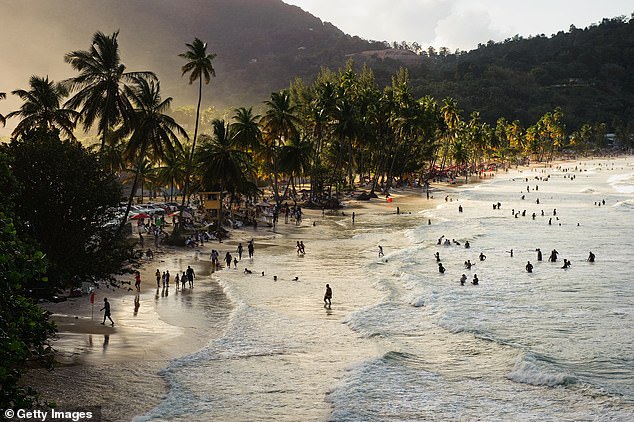
Traditonally a popular tourist destination, particularly among British travellers, Trinidad and Tobago is braced for a potential decline in foreign visitors worried about the security situation
‘It’s clear that the wave of violent gun crimes, shooting deaths and possible bloody tit-for-tat killings triggered the [declaration].’
In the past, the country’s tourism industry has remained robust in the face of such incidents. Aside from 2020, when the global pandemic resulted in a drop-off, murder rates have risen steadily since records began in 2013 – and yet, outside the Covid years, visitor numbers have remained relatively stable.
Almost 300,000 people arrived in Trinidad and Tobago by air or sea in 2024, according to government statistics – a figure that rises to almost half a million once cruise ship arrivals are factored in.
The destination is a perennial favourite with British holidaymakers, with Queen Elizabeth II putting the annual number of British visitors at about 50,000 a year in a speech delivered during a 2009 visit to the country.
But the brazen nature of the recent attacks has shaken many of the country’s 1.5 million residents, most of whom have long since become inured to gang warfare, break-ins and political fecklessness, and it remains to be seen how far the current climate of fear will affect foreign visitors.
Already there are signs of unease in the hotel sector, with Kaye Trotman, president of the Tobago Unique Bed, Breakfast and Self-Catering Association, warning of hotel cancellations following the declaration of a state of emergency.
‘We cannot escape the fallout from the economy being impacted negatively,’ Trotman told the Trinidad and Tobago Guardian. ‘It is not widespread, but we did have some [hotels] being impacted.’
Farley Augustine, Tobago’s head of government, likewise confirmed that he had received messages about cancellations ‘due to the state of emergency and the air of uncertainty it creates’.
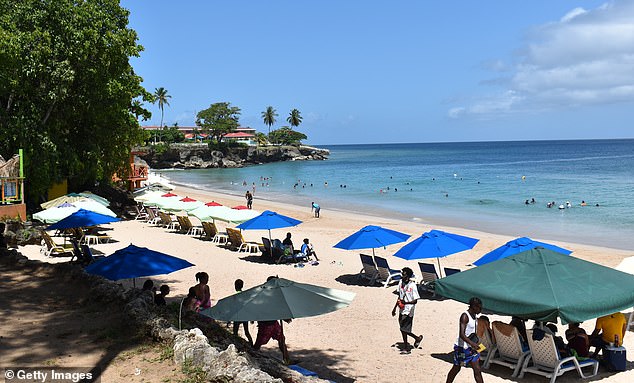
Store Bay beach in Crown Point is one of Tobago’s many magnets for tourists eager to soak up the sunshine and enjoy the idyllic Caribbean vista
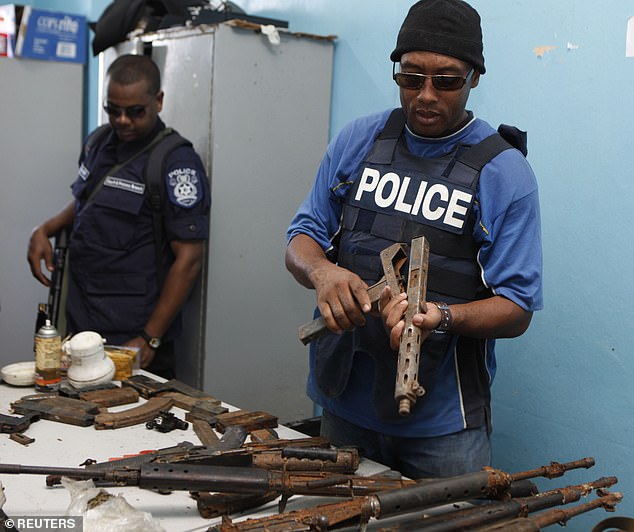
Police officers inspect rifles and ammunition found buried during a 2011 raid in Rincon Forest in Las Cuevas. Gun violence in the dual-island state has since climbed to an all-time high

Police officers stand guard outside the Ministry of National Security in Port of Spain, Trinidad and Tobago’s capital, where there were multiple shootings on the final weekend of 2024
Yet Paul Cleary, the chief executive of Caribtours, a London-based luxury holiday company specialising in Caribbean destinations, is not so sure.
‘It sounds very serious, a state of emergency,’ said Cleary. ‘It’s a very worrying phrase that has all sorts of connotations. But the reality is, we haven’t had one phone call about it, although that isn’t to say we won’t do.
‘My view, without underplaying the seriousness of the situation, is that Trinidad and Tobago is a two-island state, and the tourists that we speak to – and sell holidays to – go to Tobago, not Trinidad.
‘There is such a distinction, and there always has been. Tobago is the beautiful, sleepy, gorgeous beaches, swaying palm trees, idyllic Caribbean destination, whereas Trinidad has always been a more bustling metropolitan centre.
‘If there was any danger, we would have a duty and an obligation to do something about it. But because this is based around Trinidad, which has always been the centre for commerce, industry and trade, it doesn’t necessarily affect us at this stage.’
The Tobago Tourism Agency expressed similar sentiments this week, insisting the island remains ‘a welcoming destination for travellers’, with the emergency measures designed to ‘ensure the continued safety and wellbeing of all residents and visitors’.
‘Tobago continues to be a haven for travellers seeking relaxation, adventure and cultural experiences,’ read the statement. ‘Daily life on Tobago carries on uninterrupted, and we encourage residents and visitors alike to enjoy the island’s offerings while remaining mindful of local authorities’ guidance.’
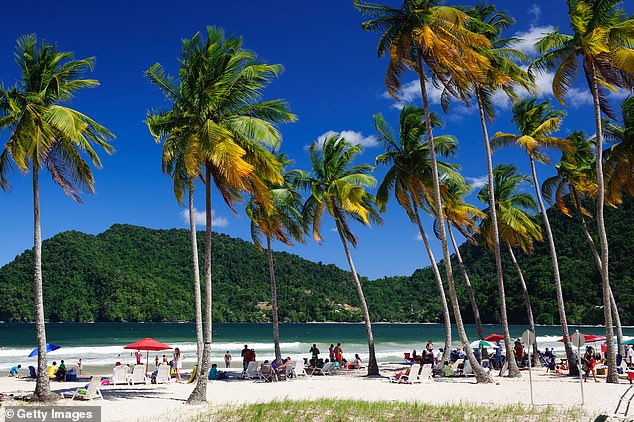
Trinidad’s Maracas Beach typifies the scenes of natural beauty that have drawn visitors to the Caribbean island nation
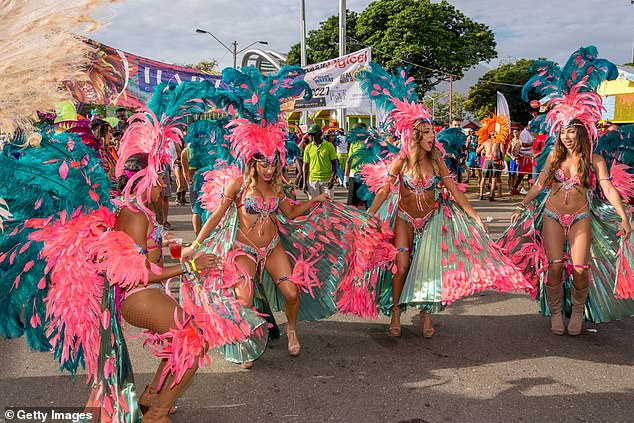
The country’s annual carnival is normally a magnet for foreign visitors, but it remains to be seen whether they will come this year in the face of foreboding travel advisories
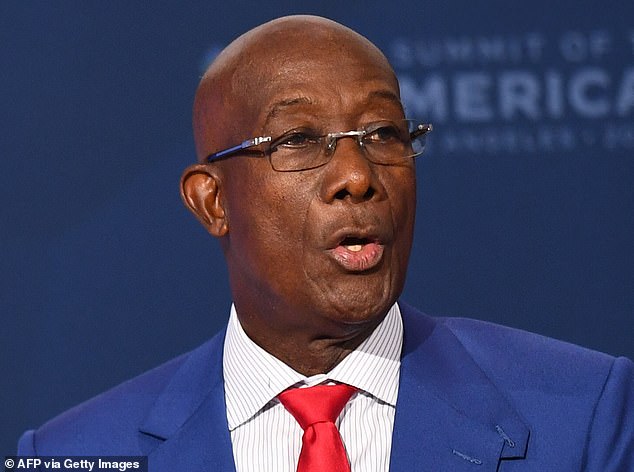
Trinidad and Tobago’s prime minister, Keith Rowley, who has struggled to tackle the nation’s soaring crime rates, did not attend a press briefing announcing the state of emergency
The state of emergency has brought an increased police and military presence to the streets, with security personnel authorised to search and detain individuals without charge and investigate properties without warrants.
But the enhanced measures may not be enough to allay the fears of holidaymakers, particularly in light of the attorney general’s admission that only ‘limited assurances’ can be made to the country’s own citizens.
Nor can it be overlooked that people from all over the country, not to mention the wider Caribbean area and beyond, traditionally converge on Port of Spain in March for the country’s renowned carnival celebrations.
Even in the best of times, the vibrant costumes and rhythmic pulse of calypso and soca serve only as colourful temporary bandages on a nation bleeding from within, and it remains to be seen whether tourists will flock to one of the murder capitals of the Caribbean to revel in the face of foreboding travel advisories.
Meanwhile, worried locals have turned their homes into fortresses, with barbed wire, iron-barred windows and high walls commonplace. The elite hire round-the-clock security, while the middle and working classes are left vulnerable to criminals who monitor their movements and strike at any opportunity.
Where once certain areas were deemed crime hotspots, today the entire country is deemed a danger zone. Residents describe a culture in which violence permeates schools, homes and communities. The simple act of being seen in public with a handbag or jewellery can be enough to make individuals a target, while the risk of becoming collateral damage in gang warfare remains ever-present.
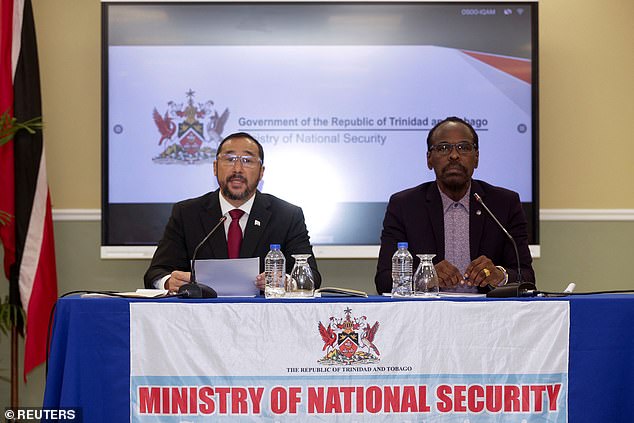
In the prime minister’s absence, acting attorney general Stuart Young, left, was tasked with announcing a state of emergency together with national security minister Fitzgerald Hinds
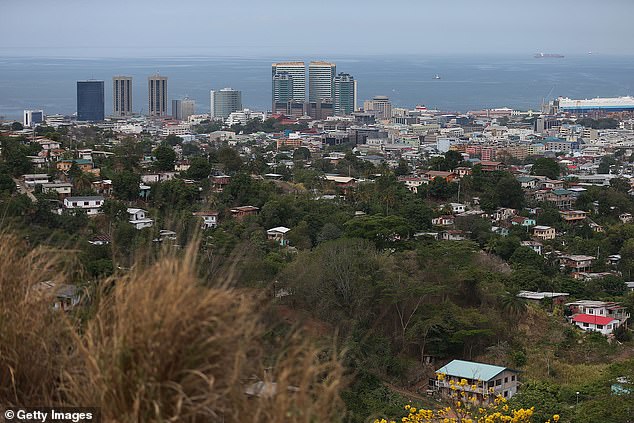
The downtown area of Port of Spain, Trinidad and Tobago’s capital, which has been the scene of rampant gun violence in recent weeks
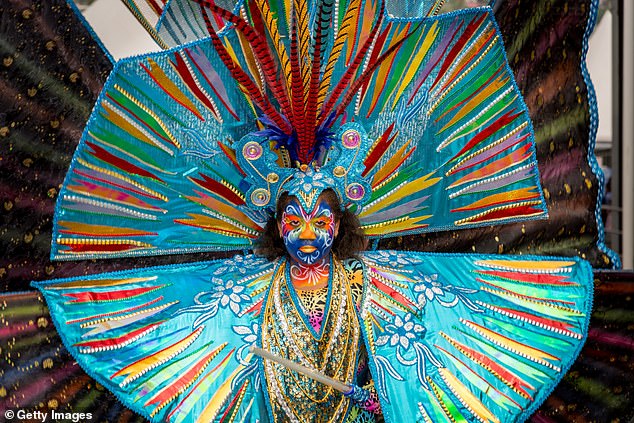
A young female Masquerader is seen at the 2017 carnival in Trinidad and Tobago
‘The quality of life has deteriorated,’ said one local concerned by the failure of government and law enforcement bodies to tackle the crime wave.
‘Paradise is in a state of decay. The wealthy have begun sending their children abroad to study and start new lives.
‘There is a running joke in Trinidad and Tobago that “God is a Trini,” because the country has often been spared from natural disasters. But with the unending bloodshed, one wonders if God has left, just like all the people who have fled in fear of becoming murder statistics.’
While many British travel agents say it is too early to assess the impact of the security situation on bookings, safety concerns undoubtedly influence the thinking of potential visitors.
‘I keep abreast of the local news in Trinidad and Tobago, and it appears that Trinidad has become a hotbed for murder, often occurring several times during a 24-hour span,’ wrote one concerned traveller on Tripadvisor after an outbreak of violence in late 2023.
‘I have planned a trip to to the island but am now reconsidering if it’s worth it, as my guests and I are very concerned about our safety, especially when local police have cautioned, and now advised, that citizens hire private security to be safely escorted to and from ATM/bank visits that involve cash withdrawals.’
The poster later cancelled the trip.
‘There are concerns within the business community that the state of emergency will have a negative impact on tourism, notwithstanding the government’s repeated statements that a curfew and other restrictions will not be implemented,’ said Alleyne.
‘The effects will be seen and felt as the [declaration] remains in effect. Perhaps at a later date we will have a better understanding of how the country has been affected.’
While the UK Foreign Office has acknowledged both the current state of emergency and a ‘high level of violent crime’ in Trinidad and Tobago, no special measures have been recommended on its online travel advice platform.
That stands in stark contrast with advice issued by the US Department of State, which last summer urged citizens to ‘reconsider travel to Trinidad and Tobago due to crime.’
The Canadian government has likewise warned against non-essential travel to certain areas, while Irish travellers have been advised by the Department of Foreign Affairs to ‘exercise a high degree of caution’.
With the public’s trust in law enforcement at an all-time low, memes have surfaced mocking the national police commissioner Erla Harewood-Christopher for suggesting that the nation should pray for safety.
The prime minister, Keith Rowley, has also come under scrutiny, not least over his failure to attend the announcement of a public emergency.
Amid public bewilderment at claims his presence would have been ‘inappropriate’, the announcement was viewed by many as a desperate attempt by the government to regain control before August’s general elections.
Yet that view was complicated by Rowley’s announcement at a press briefing on Friday that he intends to retire from electoral politics and will not seek re-election.
‘Before the end of the legal limits of this term, I will resign from this office and go off to my family,’ said Rowley, signalling the imminent end of his 45-year tenure as a public servant.
Far from wrestling back control, Rowley’s decision only raises further questions about the direction of a country long dogged by poor leadership and corruption, one where the actions of politicians and police are too often reactionary rather than preventative.
Not least among the myriad causes of Trinidad and Tobago’s soaring crime rate is a failing education system that causes disenchanted teenagers to drop out of school in their droves. Vulnerable to drug lords and the promise of fast money in an economy where jobs are at a premium, their lives are all too easily lost in drug wars or loyalty struggles.
The country’s geographic location, nestled between Latin America and the US, makes it a prime transit point for the trafficking of drugs, guns, and ammunition. International cartels play a significant role in the crime epidemic, with a parallel underground economy in the islands funding criminal activity.
Despite billions of dollars being allocated to national security each year, the major players in this veil of criminality have escaped prosecution. Instead, the political and humanitarian crisis in neighbouring Venezuela, just seven miles away, appears to have fuelled soaring crime rates.
Last November, Spanish-speaking criminals invaded the home of a pensioner. Having taken his valuables, they hogtied him and bundled him into his own vehicle, where they stabbed him to death before escaping. As with so many other murders, the perpetrators have yet to be apprehended.
It is a grim and all too familiar scenario.
Hector’s brutal assassination bears echoes of a similar tragedy that occurred in 2014, when special prosecutor Dana Seetahal was gunned down while driving in Port of Spain.
Those accused of her murder remain untried.
A decade on, Hector’s family face the same anxious wait for justice that may never come.
Source link : http://www.bing.com/news/apiclick.aspx?ref=FexRss&aid=&tid=6786563a2e6246cfbfa68540b4092963&url=https%3A%2F%2Fwww.dailymail.co.uk%2Fnews%2Farticle-14244633%2FHeaven-hell-murder-islands-streets-Trinidad-Tobago-warzone-623-murders-year-50-000-Brits-visit-year.html&c=6480032266094819639&mkt=en-us
Author :
Publish date : 2025-01-04 06:49:00
Copyright for syndicated content belongs to the linked Source.






